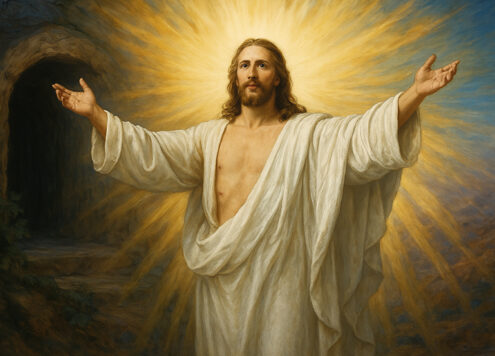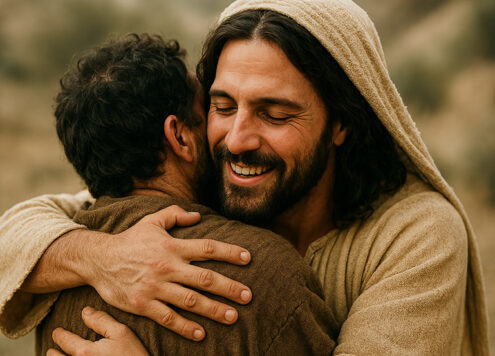“WHATSOEVER YOU DO TO THE LEAST, YOU DO UNTO ME.” —Gospel of Matthew, 25:45
I try not to be biased, but I had my doubts about hiring Stevie. His placement counselor assured me that he would be a good, reliable busboy. But I had never had a mentally handicapped employee and wasn’t sure I wanted one. I wasn’t sure how my customers would react to Stevie. He was short, a little dumpy with the smooth facial features and thick-tongued speech of Down Syndrome.
I shouldn’t have worried. After the first week, Stevie had my staff wrapped around his stubby little finger, and within a month my trucker regulars had adopted him as their official truck stop mascot.
Over time, we learned that Stevie lived with his mother, a widow who was disabled after repeated surgeries for cancer. They lived on their Social Security benefits in public housing two miles from the truck stop. Their social worker, who stopped to check on him every so often, admitted they had fallen between the cracks. Money was tight, and what I paid him was probably the difference between them being able to live together and Stevie being sent to a group home.
That’s why the restaurant was a gloomy place that morning in August, the first morning in three years that Stevie missed work.
He was at the Mayo Clinic in Rochester getting a new valve or something put in his heart. His social worker said that people with Down Syndrome often had heart problems at an early age so this wasn’t unexpected, and there was a good chance he would come through the surgery in good shape and be back at work in a few months.
A ripple of excitement ran through the staff later that morning when word came that he was out of surgery, in recovery and doing fine. Frannie, my head waitress, let out a war hoop and did a little dance in the aisle when she heard the good news.
Frannie quickly told Belle Ringer and the other two drivers sitting at his booth about Stevie’s surgery, then sighed. “Yeah, I’m glad he is going to be ok,” she said, “but I don’t know how he and his mom are going to handle all the bills. From what I hear, they’re barely getting by as it is.”
After the morning rush, Frannie walked into my office. She had a couple of paper napkins in her hand a funny look on her face. “What’s up?” I asked. “I didn’t get that table where Belle Ringer and his friends were sitting cleared off after they left, and Pony Pete and Tony Tipper were sitting there when I got back to clean it off,” she said, “This was folded and tucked under a coffee cup.”
She handed the napkin to me, and three $20 bills fell onto my desk when I opened it. On the outside, in big, bold letters, was printed “Something For Stevie”. She handed me another paper napkin that had “Something For Stevie” scrawled on its outside. Two $50 bills were tucked within its folds. Frannie looked at me with wet, shiny eyes, shook her head and said simply, “truckers.”
That was three months ago. On Thanksgiving Day, the first day Stevie was supposed to be back to work, I arranged to have his mother bring him to work, met them in the parking lot and invited them both to celebrate his return to work. Stevie was thinner and paler, but couldn’t stop grinning as he pushed through the doors and headed for the back room where his apron and busing cart were waiting. “Hold up there, Stevie, not so fast,” I said. I took him and his mother by their arms. “Work can wait for a minute. To celebrate you coming back, breakfast for you and your mother is on me.”
I led them toward a large corner booth at the rear of the room. I could feel and hear the rest of the staff following behind as we marched through the dining room. Glancing over my shoulder, I saw booth after booth of grinning truckers empty and join the procession. We stopped in front of the big table. Its surface was covered with coffee cups, saucers and dinner plates, all sitting slightly crooked on dozens of folded paper napkins. “First thing you have to do, Stevie, is clean up this mess,” I said. I tried to sound stern. Stevie looked at me, and then at his mother, then pulled out one of the napkins. It had “Something for Stevie” printed on the outside. As he picked it up, two $10 bills fell onto the table.
Stevie stared at the money, then at all the napkins peeking from beneath the tableware, each with his name printed or scrawled on it. I turned to his mother. “There’s more than $10,000 in cash and checks on that table, all from truckers and trucking companies that heard about your problems. Happy Thanksgiving.” Well, it got real noisy about that time, with everybody hollering and shouting, and there were a few tears, as well.
You know what’s funny? While everybody else was busy shaking hands and hugging each other, Stevie, with a big, big smile on his face, was busy clearing all the cups and dishes from the table.
Best worker I ever hired.











4 Comments
Deacon Thomas E Brandlin
For 18 years I worked with children and young adults with learning difficulties; many, with Down’s Syndrome. They are a gift to all of us.
Gail Zapatony
Thank you Father Duffy. That is a story that makes your heart smile! People are inherently good, we just only dwell on and hear about the bad. This stuff should be on the news.
Theresa Morton
Thank you Fr. Duffy for that very Beautiful story. 🌹
Diane M Fratus
Thank you Father Duffy. I have tears rolling down my face after reading this heartfelt story.